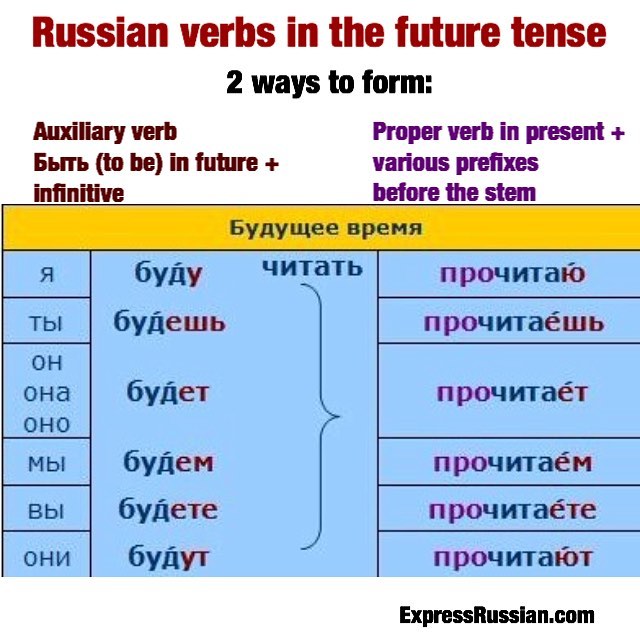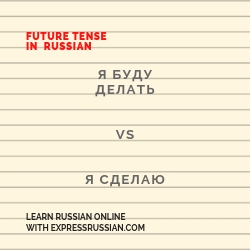In this article:
Two Forms of Future Tense in Russian
Russian future tense can have two forms:
- simple (via adding personal endings to verbs of perfective aspect), and
- compound (via using the verb “to be” in the future tense + the infinitive).
Russian Future Tense With Perfective Verbs (or Simple Future)
Simple Future Tense in Russian is formed by the verbs of the perfective aspect with the help of personal endings.
Note: Simple Future Tense can be formed only with a verb in perfective aspect form, or a perfective verb (usually dictionaries present an imperfective verb paired with its perfective form, so check them up in a dictionary!).
You will notice the difference between Russian verbs in the perfective aspect from their imperfective equivalent by a presence of a prefix or a different suffix / internal modification. What is the difference? Read below!
Verbal aspects & Russian future tense
Difference between Russian verbs in perfective and imperfective aspect
Imperfective aspect form in Russian is used if the action is continuous, habitual or if the result is unknown (it is similar to Present Simple or Present Continuous in English)
Perfective aspect form in Russian is used if the action is supposed to be finished at the moment you are talking about it or if it’s a one-time action (it is similar to Present Perfect and Past Indefinite in English)
Example:
делать (imp.) – сделать (perf.) (to do)
Present
Обычно я делаю домашнее задание вечером (Present Tense in Russian) =
Usually, I do my homework in the evening (Present SimpleTense in English)
Future
Я буду делать домашнее задание завтра (Future Compound Tense in Russian) =
I will be doing my homework tomorrow (Future Continuous Tense in English)
Я сделаю домашнее задание завтра (Future Simple Tense in Russian) =
I will do (finish) my homework tomorrow (Future Simple Tense in English)
Past
Я делал домашнее задание весь вечер (Past Tense in Russian) =
I was doing my homework whole evening (Past Continuous Tense in English)
Ты сделал домашнее задание? (Past Tense in Russian) =
Have you done your homework? (Present PerfectTense in English)
More examples of verbs in Imperfective and Perfective aspect in Russian
читать (imp.) – прочитать (perf.) (to read)
завтракать (imp.) – позавтракать (perf.) (to have breakfast)
смотреть (imp.) – посмотреть (perf.) (to look)
видеть (imp.) – увидеть (perf.) (to see)
писать (imp.) – написать (perf.) (to write)
ездить (imp.) – ехать / поехать (perf.) (to drive, to travel by any means of transport)
ходить(imp.) – пойти (perf.) (to walk)
Now, let’s come back to Russian Future Tense.
So, as you already know, to form the Simple Future Tense in Russian, you just need to use the conjugation rules of the Present Tense applied to the perfective verbs. The endings are given in the table below.
| 1st. conjugation | 2d. conjugation | |
| я ты он / она / оно мы вы они | -ю -ешь -ет -ем -ете -ют | -у/ю -ишь -ит -им -ите -ат/ят |

Examples of Simple Future Tense in Russian
Compare the verbal endings in Russian Present Tense and Simple Future Tense – they are just the same:
| Russian Present Tense | Russian Future Tense (Simple form with perfective verbs) |
| Она делает салат. She is doing (making) a salad. | Она сделает это завтра. She will do it tomorrow. |
| Я пишу письмо Ирине. I am writing a letter to Irina. | Я напишу письмо Ирине завтра. I will write a letter to Irina tomorrow. |
Related:
Prefixes in Russian Verbs of Motion – Full List with 100 + Examples
Russian Future Tense With Imperfective Verbs (or Compound Future)
Future Compound Tense in Russian is formed by the verbs of the imperfective aspect.
We use the imperfective form of a verb if the action is continuous, stretched over time, if it will be repeated, or if the result is unknown.
Compound Future Tense in Russian is formed by adding the verb “быть” (to be) in future to an imperfective verb infinitive.
This group is called “compound” because it consists of two verbs: future simple tense form of “to be” and the infinitive of the imperfective verb.
Russian Compound Future Tense is similar in structure to English Simple Future Tense; however, its meaning is closer to English’s Future Continuous Tense.
Examples of Compound Future Tense in Russian
Consult the conjugation of the verb “to be” (БЫТЬ) in the Future Tense in this table:
| Pronoun | + will/shall | + to do |
| Я Мы Ты Вы Он, она Они | буду будем будешь будете будет будут | делать |
Examples in sentences:
Я буду ждать тебя дома.– I will be waiting for you at home.
Ты будешь читать сегодня вечером?– Will you read / be reading tonight?
Она будет заниматься спортом каждый день.– She will do sports every day.
Мы не будем ездить на дачу зимой. – We won’t go to the dacha in winter.
Что вы будете делать завтра? – What will you do / be doing tomorrow?
Они не будут тебе доверять, если ты будешь так относиться к работе. – They will not trust you if you treat your work like this.
This material is a part of the online course
“Russian Grammar Made Easy” (available on Udemy platform)
It was created especially for those who need to quickly immerse themselves into the basics of Russian grammar and vocabulary.
Related topics:
Follow our social media pages on Instagram, Facebook, TikTok and YouTube for a daily dose of awesome educational content that we publish for FREE!



2 replies on “Russian Future Tense – Simple And Compound”
[…] a group of people (more than 1 person). All the conjugations (for example, verbs in past tense, verbs in future tense, adjective endings) are kept in plural […]
[…] Related: Russian Future Tense […]